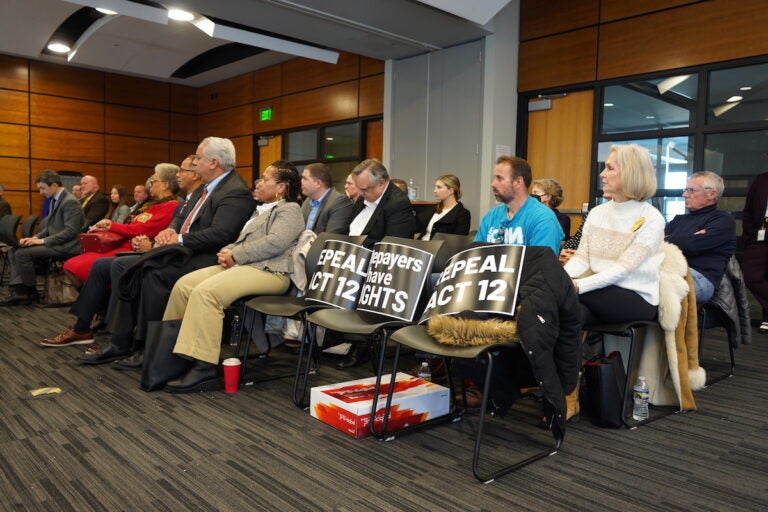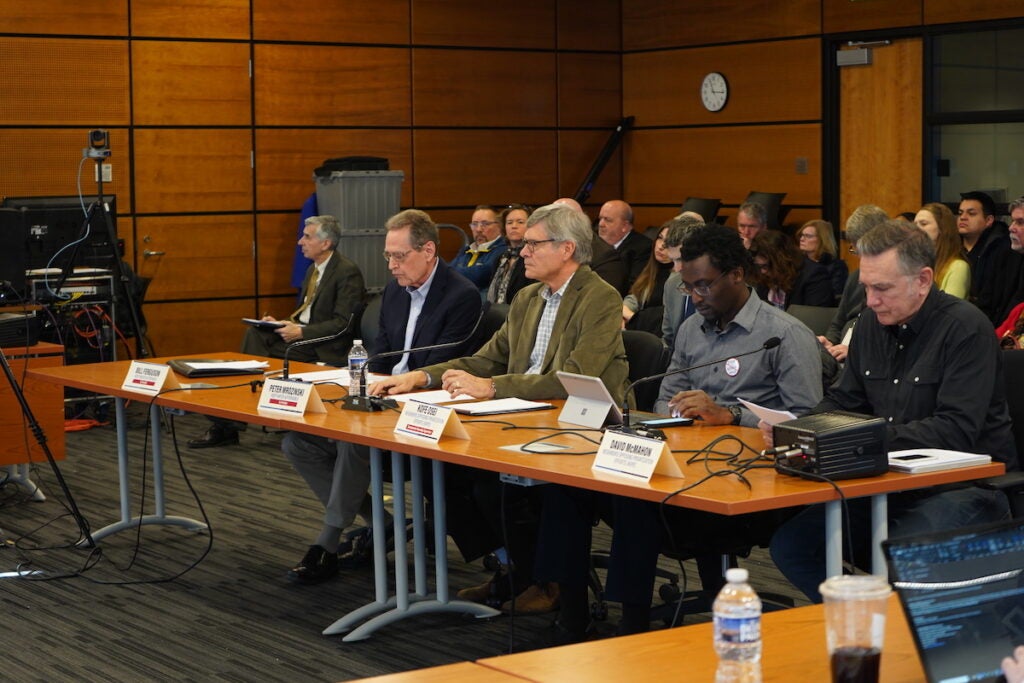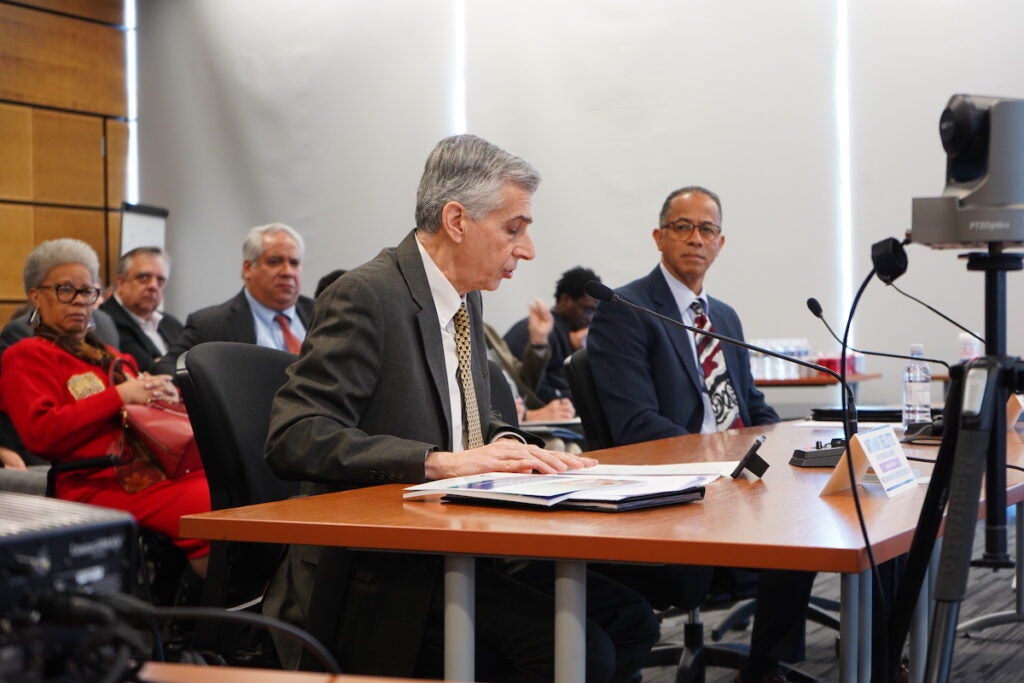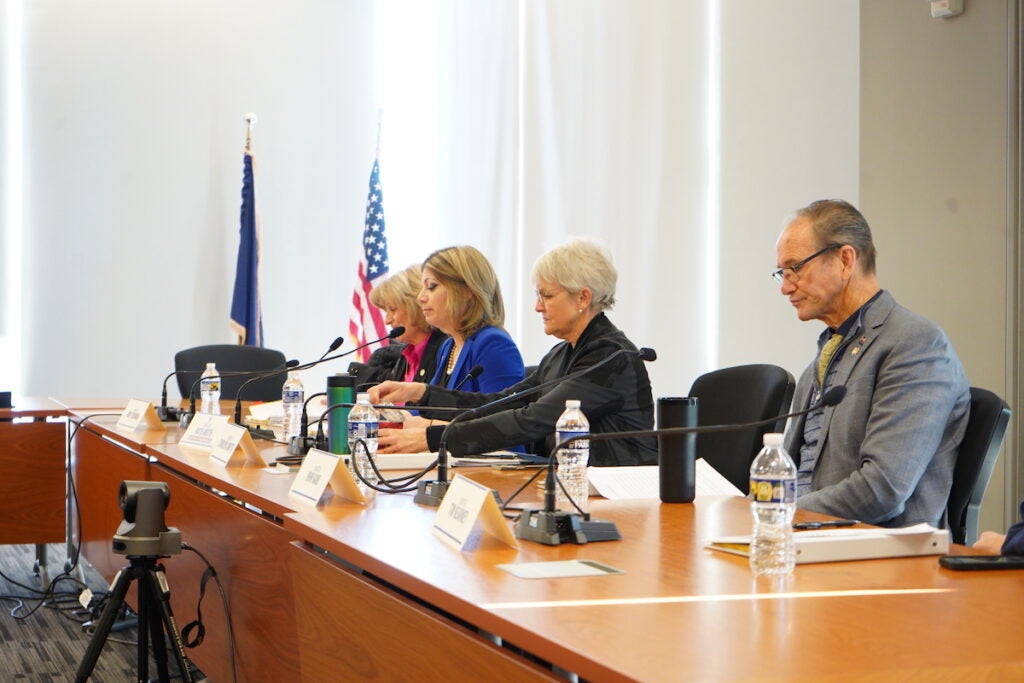Pa. Senate committee scrutinizes water privatization in Philly suburbs
Critics of Act 12 say since its adoption in 2016, for-profit water companies have lured municipalities into massive deals at the expense of the ratepayer.
Listen 1:14
Local water officials and residents alike filled the conference room in West Whiteland and placed signs in the first few seats calling for an appeal of Act 12. (Kenny Cooper/WHYY)
From Delco to Chesco and Montco to Bucks, what about life in Philly’s suburbs do you want WHYY News to cover? Let us know!
As private water companies continue to acquire more public water systems in Pennsylvania, state lawmakers are scrutinizing a 2016 amendment to the public utility code, also known as Act 12.
The law outlines a negotiating framework to determine the value of a public water system including assets, predicted revenue, and expected repair costs.

Critics of the law say since its passage, water companies have seized the attention of local officials by dangling massive short-term acquisition prices, buoying a locality’s purse in the short term — but harming the ratepayer in the long run with price hikes and leaving residents disillusioned with the process.
“All the consequences of Act 12 derived from the simple fact that Act 12 has given the green light for private utilities to lure local municipalities into deals that are bad for their residents who are then left to pay the bill,” said Peter Mrozinski, a co-founder of Keep Water Affordable.
At a Senate Democratic Policy Committee hearing Monday in West Whiteland Township, Chester County, two panels of advocates, experts, and impacted residents debated Act 12’s impact on skyrocketing rate hikes and discussed legislative changes to remedy the situation.
“The fight we’ve been involved in here in southeastern Pennsylvania ultimately revolves around one fundamental question,” said David McMahon, of Neighbor’s Opposing Privatization Efforts (NOPE), to a full room of spectators. “Who does the world’s water belong to?”

McMahon said Act 12 has made it too easy to take what was once a public resource, and put it in the hands of profit-making companies.
Suburban Philadelphia is a hot spot for water privatization including Aqua Pennsylvania’s takeover of Willistown Township’s sewer system in 2022 and Pennsylvania American Water’s acquisition of Upper Pottsgrove’s wastewater system in 2020. The trend spans state lines, and more than two dozen public water suppliers have been bought by investor-owned utilities across the region in the past five years.
Soon after the passage of Pennsylvania’s Act 12 in 2016, the Bryn Mawr-based Aqua, which owns water companies nationwide, purchased water systems in Cheltenham and Limerick, among other places.
The Pennsylvania Public Utility Commission has approved 22 acquisitions since the law’s passage. Advocates and lawmakers alike believe the subsequent spending spree to be no accident.
“Act 12 of 2016 made significant changes to the way water and wastewater systems are valued for acquisition,” said state Sen. Katie Muth, chair of the Pennsylvania Senate Democratic Policy Committee at the hearing.
In written testimony to the legislators, Aqua Pennsylvania President Marc Lucca defended the company’s practices, saying it has learned a lot since Act 12 was adopted.
“We’ve heard concerns around the impact of purchase price on customer rates, transparency of the sale process, and ensuring that terms of contracts are met. To be clear, we stand ready to work to address those issues,” Lucca said.
However, Lucca rejected any notion that Act 12 should be repealed, arguing that municipality owned water utilities do not have the funds to update their aging systems.
“In summary, our nation’s infrastructure is failing because of lack of investment. We are leaving the next generation a significant problem they need to address simply because we did not. The condition of these systems occurred long before Act 12 so I simply do not agree with the sentiment that removing it will correct these problems,” Lucca said.
Public resource vs. private commodity
Bill Ferguson, a co-founder of Keep Water Affordable and a New Garden Township resident, testified that private water companies exist to expand and increase profits.
He acknowledged that’s what corporations do.
“Our issue is with their methods used to acquire the municipal utilities, [which is] required to realize that growth,” said Ferguson. “Then there’s the municipal governments, too often infatuated by the seductive siren song of a huge candy jar of money — free money. It’s like winning the lottery but that money is in no way free. The failure of local government to properly serve their citizens is probably our biggest concern.”
He said ratepayers are paying for “Big Water’s” profits and deals. He likened the publicly owned water acquisitions to offering a car dealership $80,000 for a vehicle they’re selling for $40,000.
”That’s what’s happening under Act 12. Both parties at the negotiating table want the highest price possible. You’d ask why would Big Water want to pay higher prices? It’s simple. The more they pay, the higher their profits, as long as the purchase price goes into the rate base. And that’s what Act 12 enables. It enables the increase in rate base. The water companies cannot lose. It is one sweet deal for them,” Ferguson said.
Anthony Bellitto, executive director of the publicly owned North Penn Water Authority and a representative with the Pennsylvania Municipal Authorities Association (PMAA), said the PMAA’s stance is that Act 12 should be repealed.
In the case that it is not repealed, Bellitto said the organization suggests Act 12 be amended to include a voter referendum and a scope limitation to distressed municipalities.

Bellitto said any assertion that low rates equals infrastructure disinvestment is false.
“We’re a nonprofit,” Bellitto said. We provide low cost and high value to our customers. At North Penn Water Authority, our average customer spends $1 per day for all the water for a household.”
Bellitto criticized the for-profit business model in public utilities due to the high salaries of top executives.
“My entire organization of North Penn Water Authority — 52 employees. Our whole aggregate salary is four and a half million dollars. There you go. You got the whole company doing all the work every day, 52 employees making the same amount of money as the top guy at Aqua. This is why they have to raise the rates,” he said.
“This aggressive push to privatize municipal systems is driven by an upper management of these private utilities who are motivated by their own personal financial benefit,” Bellitto said.
But not everyone who testified wants to kill Act 12.
In some municipalities that have garnered the interest of private water companies — like Chester and Towamencin, residents have gone on the offensive to block the deals, oftentimes clashing with elected leaders. Results, however, have been mixed.
Kofe Osei, an organizer with NOPE and a newly elected Towamencin Township Supervisor, said privatization efforts have had a negative impact on democracy. He said Pennsylvania American Water’s attempt to purchase Towamencin’s sewer system, which is tied up in court, has laid bare issues of the state’s referendum laws.
“Even in the face of lawsuits from residents to compel the township to exit the sale, the pro-sale supervisors have committed public dollars in our budget to defending their clearly unpopular decision in court,” Osei said.
The Public Advocate vs. The Public Utility Commission
The second panel of the day focused on policy solutions from the perspective of local utility and municipal leadership, which included the Pennsylvania Office of the Consumer Advocate, and the Pennsylvania Public Utilities Commission.
Pennsylvania’s Consumer Advocate Patrick Cicero also called for the repeal of Act 12. Referring to it as an “utter failure,” Cicero said his office has found that water and wastewater rates in Pennsylvania have grown at some of the fastest rates in the country.
As a result, he said people are unable to pay their bills.
Cicero said that if the legislature cannot agree to a full repeal, his office’s second recommendation is to sunset the provisions in the law after a set date and conduct a complete review of Act 12.
While Stephen DeFrank, chairman of PA Public Utility Commission, did not offer a definitive policy stance from his agency, which ultimately approves all rate hikes. DeFrank said there is an underlying interplay between Act 12 and Act 11 of 2012 that is also fueling rate increases.

Act 11 allows private companies, which own multiple water and wastewater treatment systems, to spread the cost of upgrades among its entire statewide customer base, regardless of where a ratepayer draws water. DeFrank refers to this as a “cross subsidization tool.”
“This cross subsidization tool has become increasingly utilized,” DeFrank said.
The PUC has to approve any “distribution improvement” charges laid out in Act 11.
Amy Sturges, the deputy executive director of advocacy for the Pennsylvania Municipal League, which represents 142 member cities, townships, and boroughs, testified the League supports local decision-making in general.
Sturges said a poor taxing structure in conjunction with a limited tax base, unfunded mandates, exorbitant infrastructure costs, and non-routine property tax assessments have created a perfect storm of fiscal pressures to sell off a municipal system.
“These pressures do not exist in a vacuum,” Sturges said.” It is not uncommon for a community to be faced with all of these factors at once therefore balancing the costs with the ability of taxpayers to support services can be a significant challenge. It’s little wonder what selling a system and getting out from under federal and state mandates and infrastructure costs is attractive to local officials?”
Sturges said action is needed from the General Assembly to “ease these systemic pressures.”
State Sen. John Kane has already introduced a bill to repeal Act 12, but it faces an uphill battle in the GOP-controlled state senate.
If Act 12 is repealed, all five acquisitions currently before the PUC would be removed from consideration.
WHYY is your source for fact-based, in-depth journalism and information. As a nonprofit organization, we rely on financial support from readers like you. Please give today.






